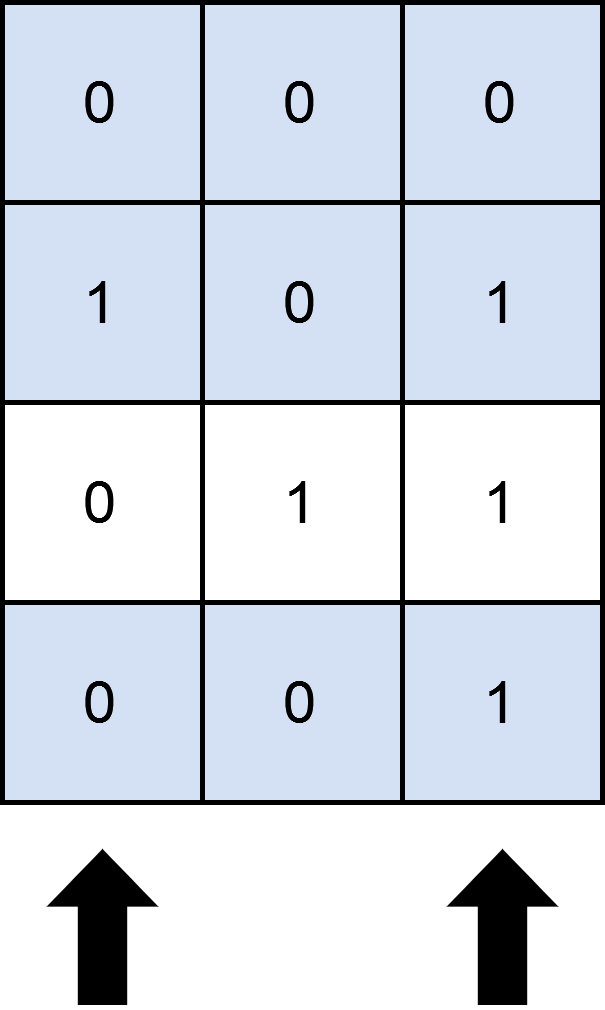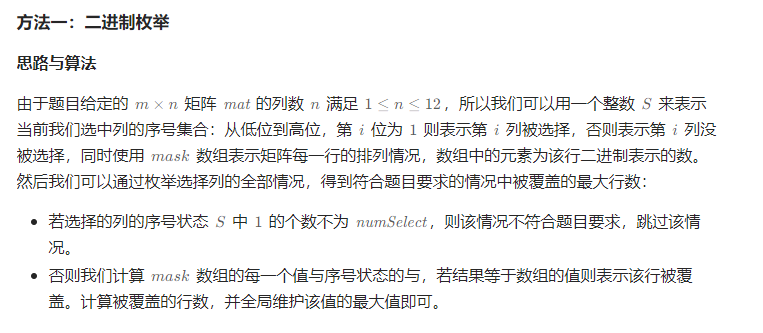2397. 被列覆盖的最多行数
发布时间:2024年01月04日
给你一个下标从?0?开始、大小为?m x n?的二进制矩阵?matrix?;另给你一个整数?numSelect,表示你必须从?matrix?中选择的?不同?列的数量。
如果一行中所有的?1?都被你选中的列所覆盖,则认为这一行被?覆盖?了。
形式上,假设?s = {c1, c2, ...., cnumSelect}?是你选择的列的集合。对于矩阵中的某一行?row?,如果满足下述条件,则认为这一行被集合?s?覆盖:
- 对于满足?
matrix[row][col] == 1?的每个单元格?matrix[row][col](0 <= col <= n - 1),col?均存在于?s?中,或者 row?中?不存在?值为?1?的单元格。
你需要从矩阵中选出?numSelect?个列,使集合覆盖的行数最大化。
返回一个整数,表示可以由?numSelect?列构成的集合?覆盖?的?最大行数?。
示例 1:

输入:matrix = [[0,0,0],[1,0,1],[0,1,1],[0,0,1]], numSelect = 2
输出:3
解释:
图示中显示了一种覆盖 3 行的可行办法。
选择 s = {0, 2} 。
- 第 0 行被覆盖,因为其中没有出现 1 。
- 第 1 行被覆盖,因为值为 1 的两列(即 0 和 2)均存在于 s 中。
- 第 2 行未被覆盖,因为 matrix[2][1] == 1 但是 1 未存在于 s 中。
- 第 3 行被覆盖,因为 matrix[2][2] == 1 且 2 存在于 s 中。
因此,可以覆盖 3 行。
另外 s = {1, 2} 也可以覆盖 3 行,但可以证明无法覆盖更多行。
示例 2:

输入:matrix = [[1],[0]], numSelect = 1 输出:2 解释: 选择唯一的一列,两行都被覆盖了,因为整个矩阵都被覆盖了。 所以我们返回 2 。
提示:
m == matrix.lengthn == matrix[i].length1 <= m, n <= 12matrix[i][j]?要么是?0?要么是?11 <= numSelect?<= n
题解:

code:
public int maximumRows(int[][] matrix, int numSelect) {
int m = matrix.length;
int n = matrix[0].length;
int[] mask = new int[m];
for (int i = 0; i < m; i++) {
for (int j = 0; j < n; j++) {
if (matrix[i][j] == 1) {
mask[i] += matrix[i][j] << (n - j - 1);
}
}
}
int res = 0;
int cur = 0;
int limit = (1 << n);
while (++cur < limit) {
if (Integer.bitCount(cur) != numSelect) {
continue;
}
int t = 0;
for (int j = 0; j < m; j++) {
if ((mask[j] & cur) == mask[j]) {
t++;
}
}
res = Math.max(res, t);
}
return res;
}
文章来源:https://blog.csdn.net/xiao__jia__jia/article/details/135392890
本文来自互联网用户投稿,该文观点仅代表作者本人,不代表本站立场。本站仅提供信息存储空间服务,不拥有所有权,不承担相关法律责任。 如若内容造成侵权/违法违规/事实不符,请联系我的编程经验分享网邮箱:chenni525@qq.com进行投诉反馈,一经查实,立即删除!
本文来自互联网用户投稿,该文观点仅代表作者本人,不代表本站立场。本站仅提供信息存储空间服务,不拥有所有权,不承担相关法律责任。 如若内容造成侵权/违法违规/事实不符,请联系我的编程经验分享网邮箱:chenni525@qq.com进行投诉反馈,一经查实,立即删除!